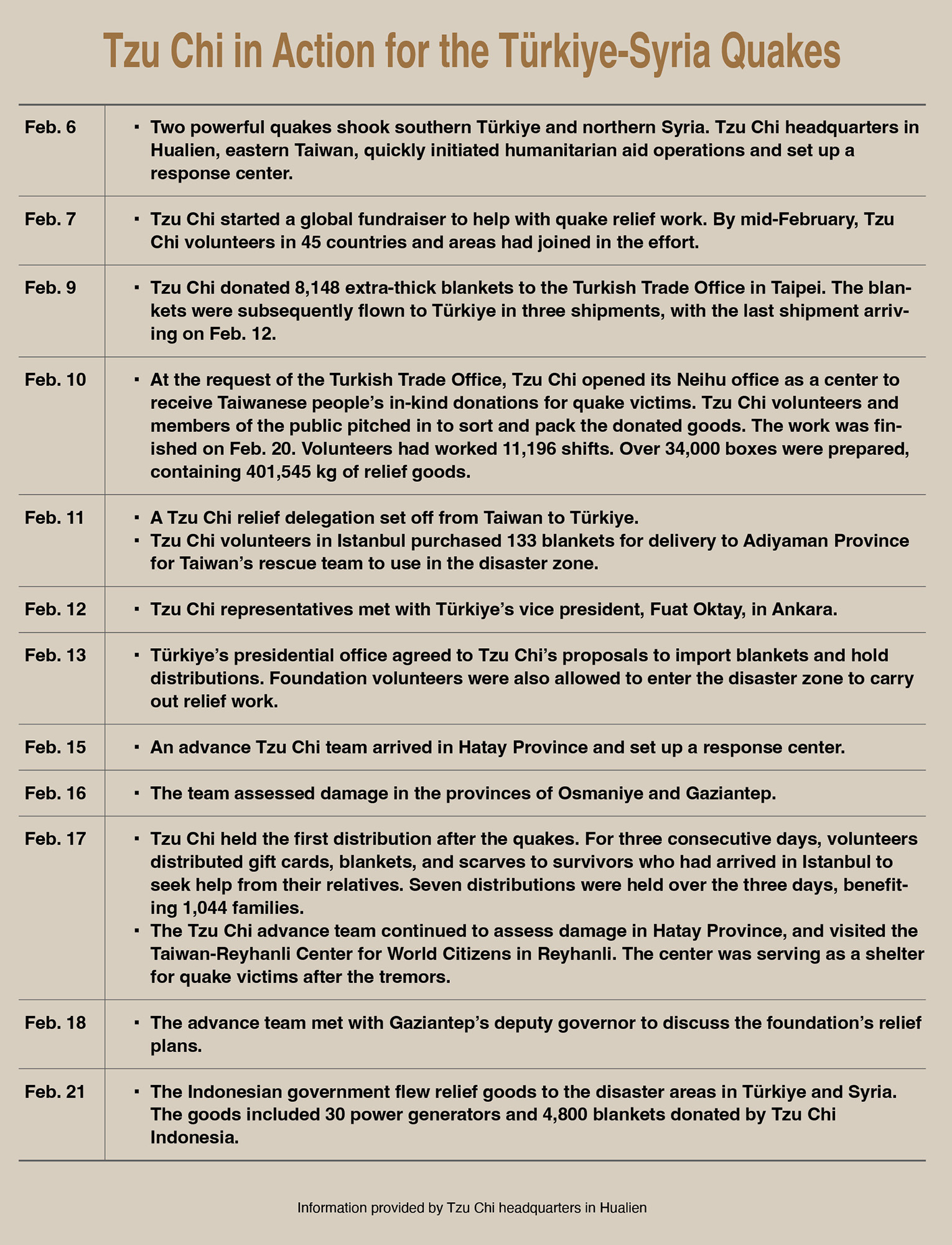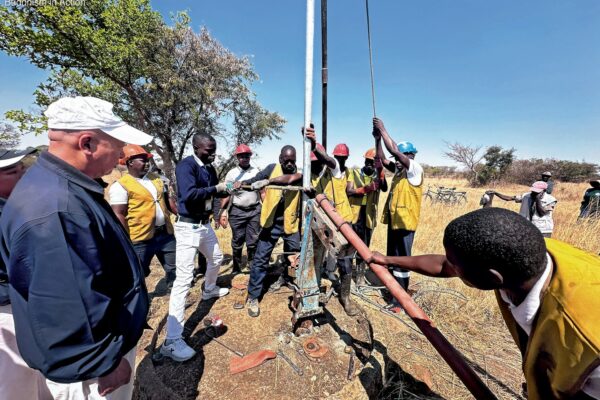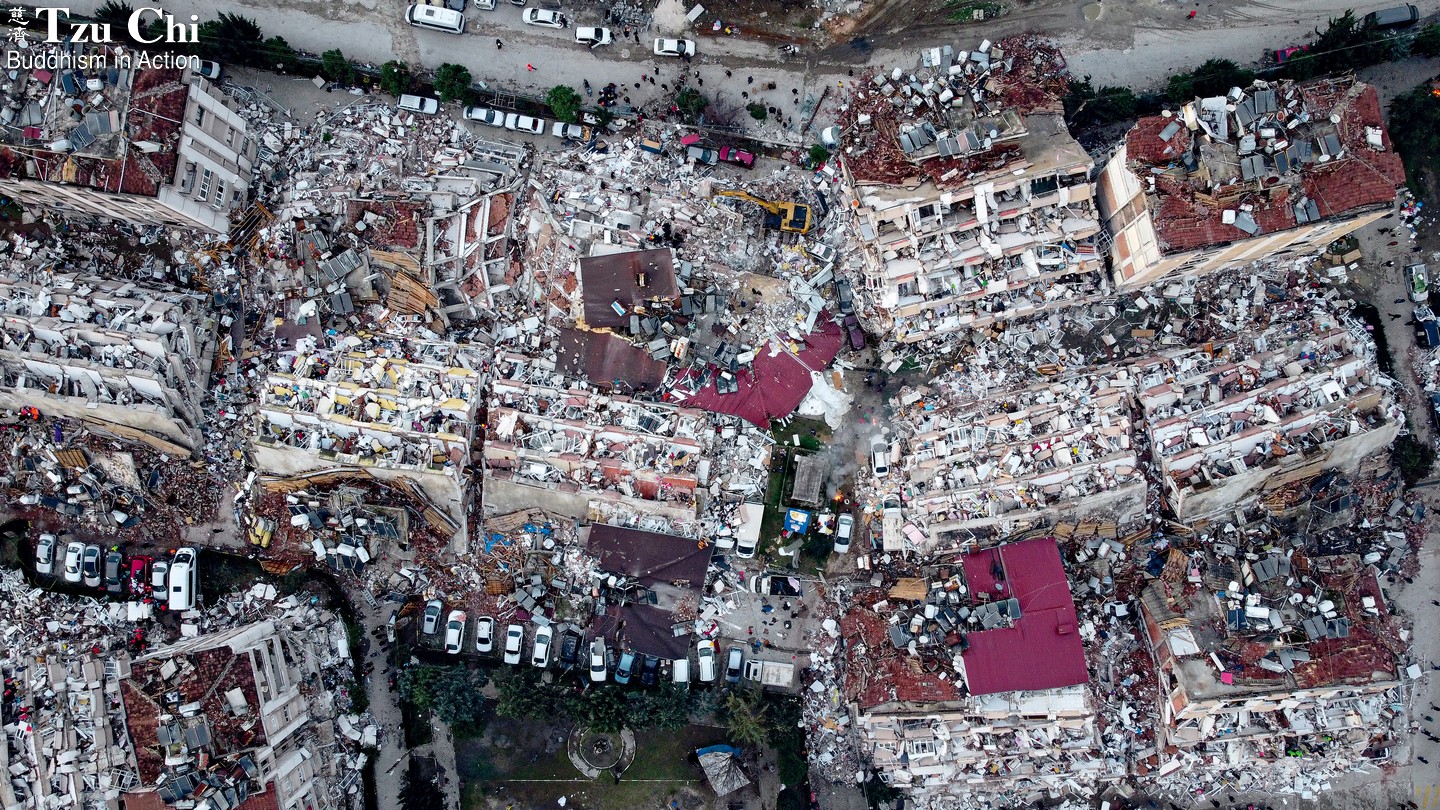
A bird’s eye view of a central area in Hatay Province, southern Türkiye, after the quakes. Almost all the local buildings have collapsed. COURTESY OF TPG IMAGES
By Yeh Tzu-hao
Information provided by Ning Rong
Translated by Wu Hsiao-ting
The recent Türkiye-Syria earthquakes resulted in staggering destruction and loss of life, shocking the world. Tzu Chi is bringing warmth and love to survivors to help them through the harshest winter of their lives.
People in Türkiye (formerly Turkey) are no strangers to earthquakes, but the scale of the one that occurred on February 6 was worse than anyone could have anticipated.
On that fateful day, a few foreshocks shook southern Türkiye sometime before daybreak. Kurdi, a resident of Hatay, the southernmost province of the nation, didn’t think much of them at first. But then he heard a loud rumbling sound from the earth, followed by violent shaking and then a blackout. “My children were all screaming,” said Kurdi. “My youngest son fell on me and became completely silent.”
Using all his strength, Kurdi pulled his four-year-old son out from under a collapsed closet. Then they and the rest of their family hurried downstairs in the darkness. When they had escaped to safety outside, they turned and saw the six-story building in which they had lived collapse in front of their eyes, one floor after another. “The violence of the shaking this time blew my mind,” Kurdi recalled. “You had only a few short minutes to respond.”
Outside, it was very cold and raining. Kurdi waited until it was light, then began quickly working with his neighbors to rescue survivors from under the rubble. “Over the next three days, there were people calling for help from under toppled buildings on every street. But I had only a hammer. When I had managed to get one person out, more asked for help from me. Some refused to be saved because their family members had been killed.”
Some time later, Kurdi and his family went to Istanbul to live temporarily with relatives. During the 1,100-kilometer (685-mile) journey there, they didn’t eat or drink anything. The meal they had at El Menahil International School, where Kurdi’s brother worked, was their first meal in three days.
Kurdi’s face had been injured, having been hit hard by a falling object during the quake. His clothes were covered in dust, and his hands, soiled and swollen, trembled every now and then. He was agitated and emotional whenever he recalled rescuing people in the aftermath of the quake.
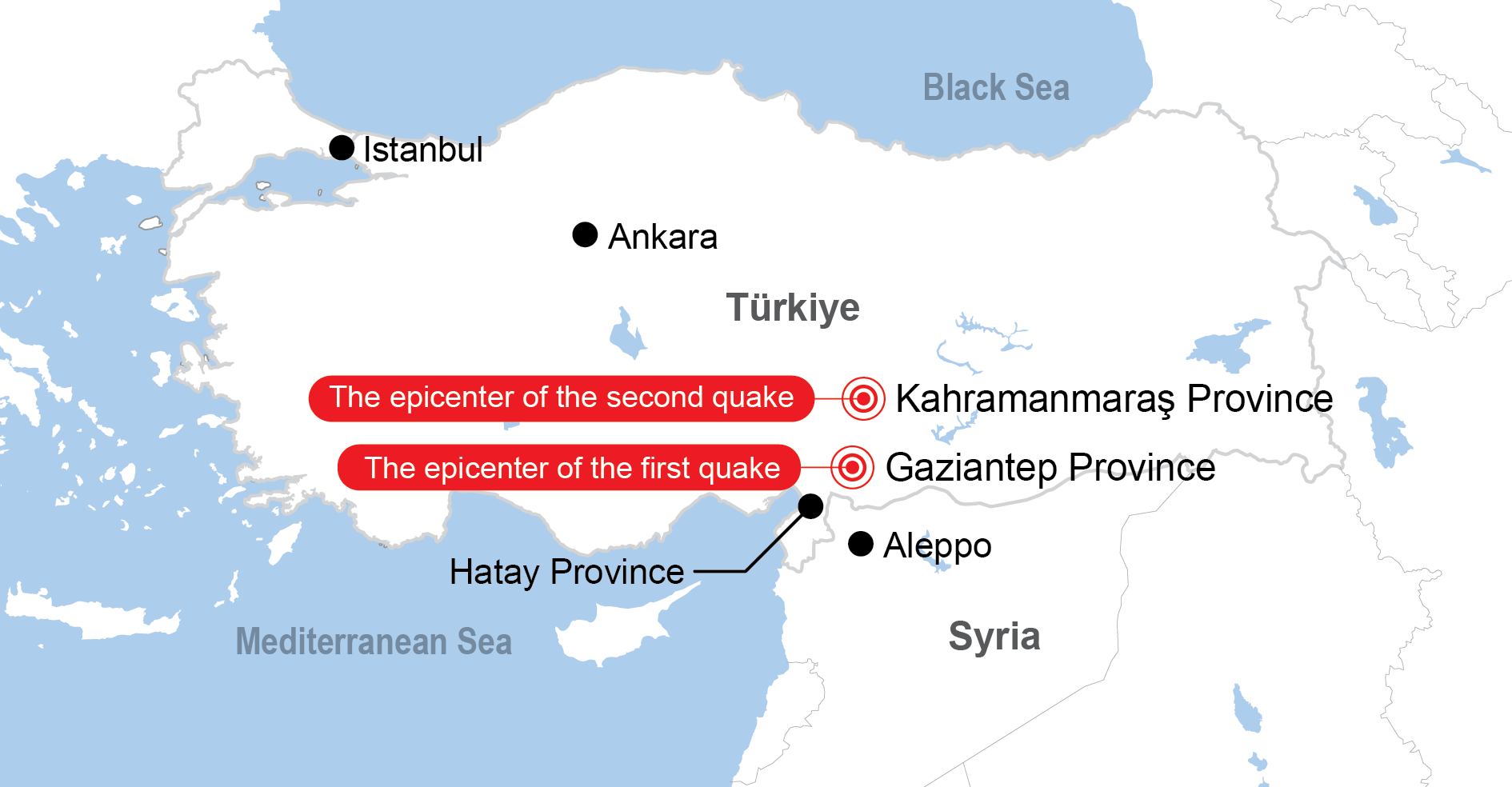
Türkiye-Syria Earthquakes
‧ At 4:17 a.m. on February 6, a 7.8-magnitude shallow earthquake hit southern Türkiye, followed by another powerful earthquake—magnitude 7.5—at 1:24 that afternoon.
‧ More than 46,000 people were killed in Türkiye and Syria, and more than 100,000 people were injured. Over 345,000 buildings collapsed or were severely damaged.
‧ The disaster area was three times as large as Taiwan. The death toll was two times larger than that of the 2011 Tohoku earthquake and tsunami in Japan.
Last updated: February 20, 2023
A perfect storm
The magnitude 7.8 earthquake rocked Gaziantep Province, in south-central Türkiye, at 4:17 a.m. local time on February 6. A large number of residential buildings were reduced to rubble while people slept soundly. Nine hours later, another strong quake, this one with a magnitude of 7.5, hit Kahramanmaraş Province, to the north of Gaziantep. The result was more damage, death, and injury.
The severity of the devastation was caused by a perfect storm of factors: the large magnitude of the quakes, buildings not built to withstand severe earthquakes, and a bitter cold front that dropped the temperatures to lower than -10°C (14° F) the day after the quakes. The combination of these resulted in more than 40,000 people killed, 100,000 injured, and over ten million affected in Türkiye alone.
Türkiye, which encompasses the junction of three tectonic plates, is prone to earthquakes. In 1999, for example, the country was struck by two earthquakes with a magnitude greater than seven. But the strong tremors that had hit the nation had for decades been concentrated in the east and northwest; the south hadn’t been hit by a major quake in over a century. The capability of local buildings, both old and new, to resist a quake had never been tested.
The two powerful earthquakes and a series of aftershocks wrecked a huge area in 11 southern provinces in Türkiye. The disaster zone was three times as large as Taiwan. Some regions in northern Syria, located to the south of Türkiye, also suffered severe damage.
Northern Syria has long been under the control of resistance forces; armed conflicts have been going on there since the Syrian civil war broke out in 2011. Almost all of the buildings that had not been destroyed in the war had sustained some sort of damage from artillery and mortar shelling, which made them even less capable of withstanding a major earthquake. It’s sad to think of the Syrian people, who have already suffered a lot from the war, to be hit by even more tragedy.
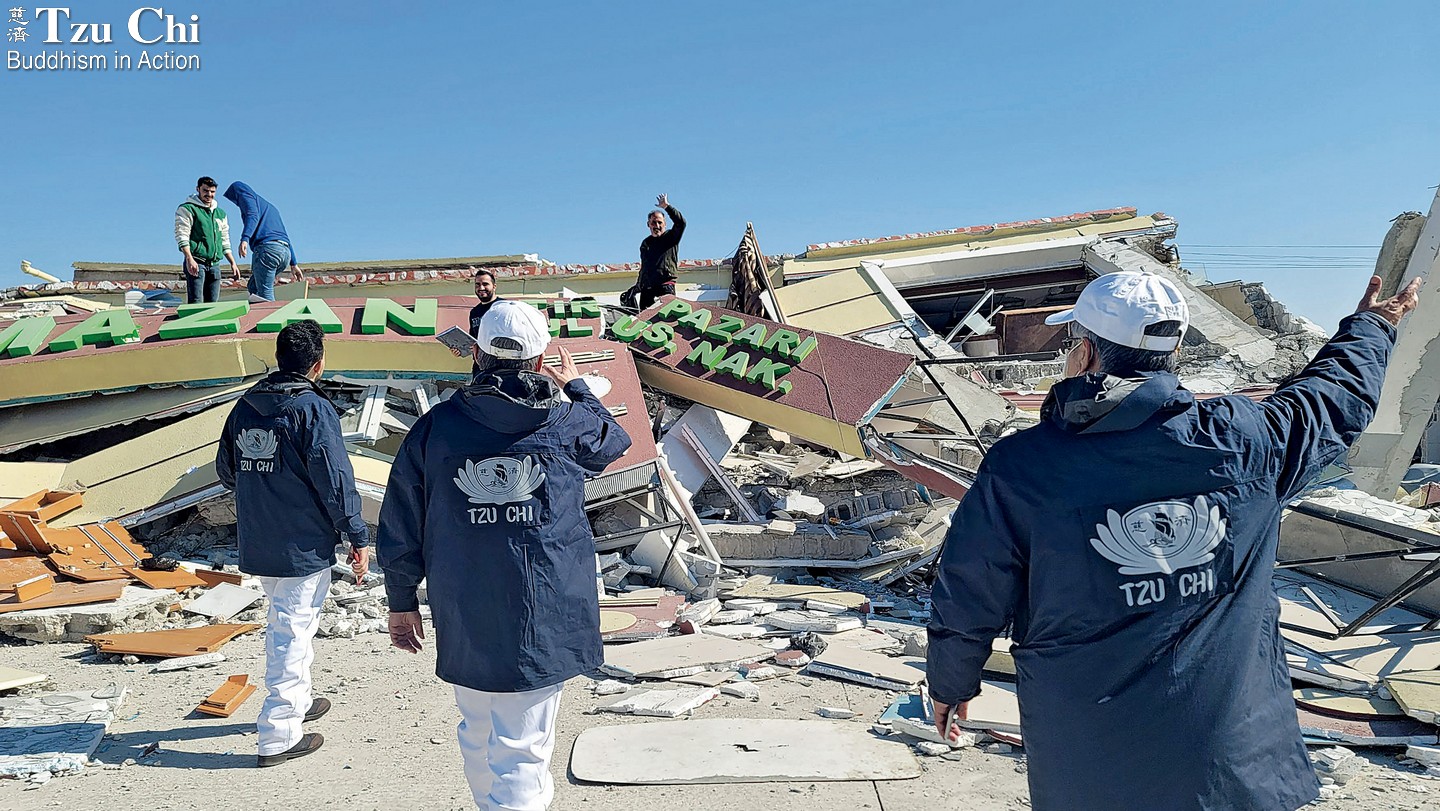
Tzu Chi volunteers assessing damage in Hatay Province greet quake survivors who had returned to their collapsed homes to salvage belongings. YU ZI-CHENG
Rushing in blankets
The devastation caused by the earthquakes shocked the world. More than 60 countries sent in rescue teams to help save lives. Taiwan’s National Fire Agency, for example, dispatched 130 rescuers in two groups to Türkiye. The first group arrived in Adiyaman Province, a hard-hit area, on February 8. Volunteers from the International Headquarters S.A.R., Taiwan, a non-governmental organization, also flew to Türkiye to aid in the search and rescue efforts.
The Tzu Chi Foundation, based in Taiwan, responded quickly too. While preparing to dispatch a delegation to Türkiye to assess damage and carry out relief work, the foundation launched a fundraiser and initiated other aid work in the immediate aftermath of the disaster.
“The disaster area is huge,” said Yen Po-wen (顏博文), CEO of the Tzu Chi charity mission. “But wherever we want to go [within the disaster area], we are required to work with the Turkish government or the organizations they have authorized to coordinate the relief work.” The CEO said that the Turkish government allowed only rescue workers and media personnel to enter the disaster areas immediately after the quake; all donations of relief supplies, on the other hand, were required to be referred to Türkiye’s Disaster and Emergency Management Presidency for management and distribution. In other words, all aid from abroad, once it was transported into Türkiye, was to be handed over to the Turkish government for further allocation. Any distribution events would have to be supervised by government agencies as well.
After the tremors, Recep Tayyip Erdoğan, the President of Türkiye, declared a state of emergency for the earthquake zone. The government tightly controlled everything, including the coming and going of people and goods related to disaster relief work. It was a real challenge to obtain tax-exemption on imported relief goods or get permission to collect, transport, and distribute relief goods on one’s own. Even so, Tzu Chi personnel worked hard to negotiate with the Turkish government on these matters.
On February 8, Tzu Chi headquarters in Hualien, eastern Taiwan, instructed the foundation’s Neihu office in Taipei, northern Taiwan, to quickly prepare and pack more than 8,000 extra-thick Tzu Chi blankets (made from recycled plastic bottles) to be transported to Türkiye by air. Tzu Chi volunteers in northern Taiwan worked overnight and had all the blankets ready for shipping the very next day. The first batch of blankets were flown to Türkiye that very night.
“Standard-size Tzu Chi blankets are packed five to a bag and two bags to a box,” explained volunteer Wu Yue-ying (吳月鶯). “The extra-thick blankets, on the other hand, are packed three to a bag and two bags to a box.” Wu added that the 8,000-plus extra-thick blankets weighed about the same as more than 13,000 standard-size blankets. Since the weather was cold in the disaster areas, the blankets would be very useful to survivors.
“Thanks to all Taiwanese people,” said Muhammed Berdibek, Türkiye’s representative to Taiwan. “Thanks for your generous support for Türkiye after the quake.” Berdibek said those words in the donation ceremony for the 8,000-plus blankets, held at the Turkish Trade Office in Taipei. The representative also thanked Tzu Chi for their help. He said that when their trade office called for in-kind donations from Taiwanese people after the tremors and needed a place to receive and sort the donated goods, Tzu Chi donated blankets to them and provided its facility (the Tzu Chi Neihu office) to serve as a center to receive the goods donated by Taiwanese people. His gratitude for the foundation was obvious.
“The quakes wreaked such havoc that almost all houses in the disaster areas collapsed,” said Ayse Ucar (耿慶芝), a staffer at the Turkish Trade Office in Taipei. “Survivors are sleeping outdoors and have no access to running water or electricity. The Turkish government can’t tend to the needs of so many people at the same time, so they appealed for aid from the outside world.” Ucar added that Türkiye’s diplomatic posts all over the world had started raising needed relief items for the quake victims in their country.
The Turkish Trade Office in Taipei solicited the donation of 17 kinds of necessities from Taiwanese people, including new or unused winter clothes, blankets, and sleeping bags. Donated items began flooding into Tzu Chi’s Neihu office as soon as their donation request was sent out. Tzu Chi volunteers and many members of the public pitched in to sort and pack the goods. Working together, they sorted and packed more than 400 tons of goods.
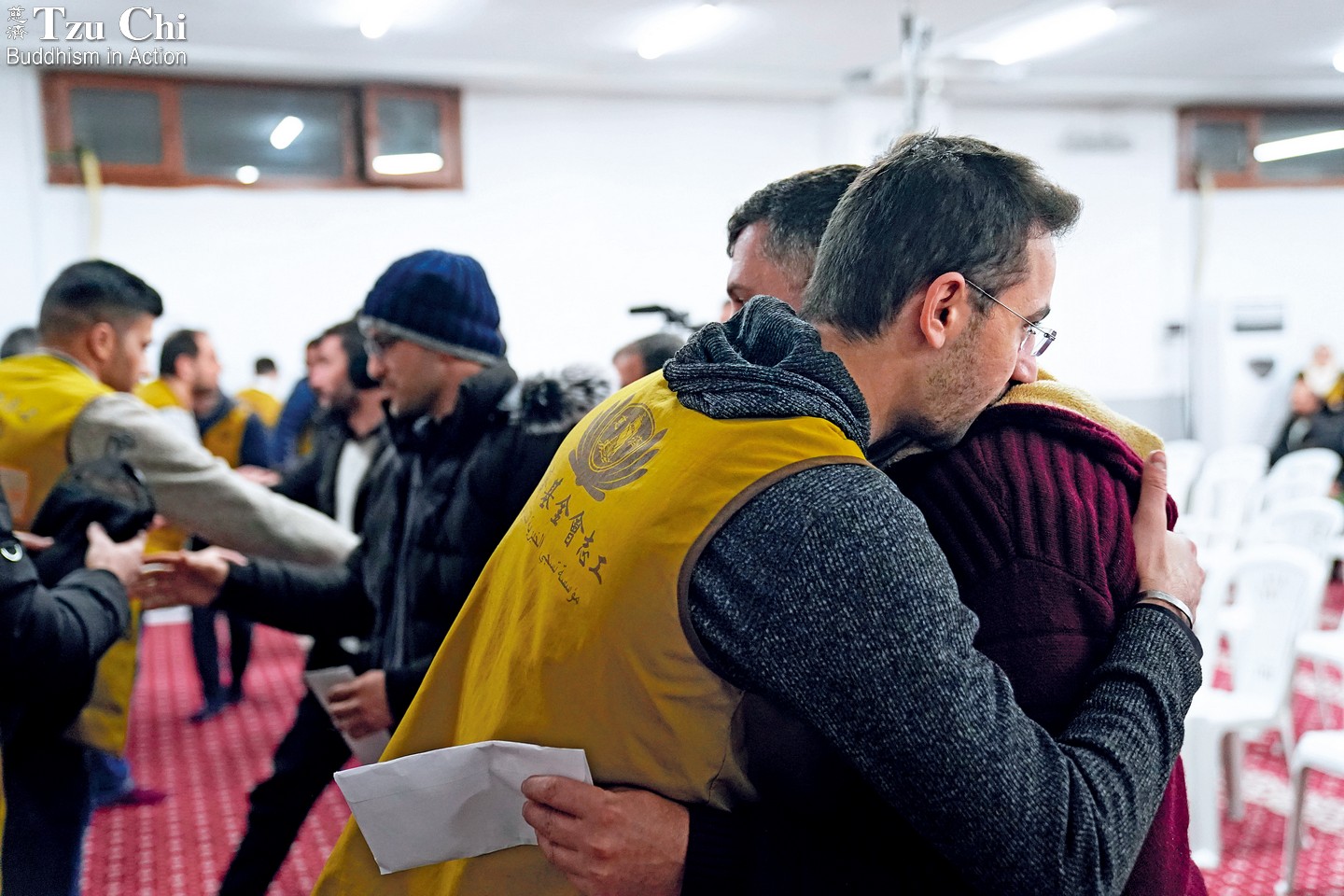
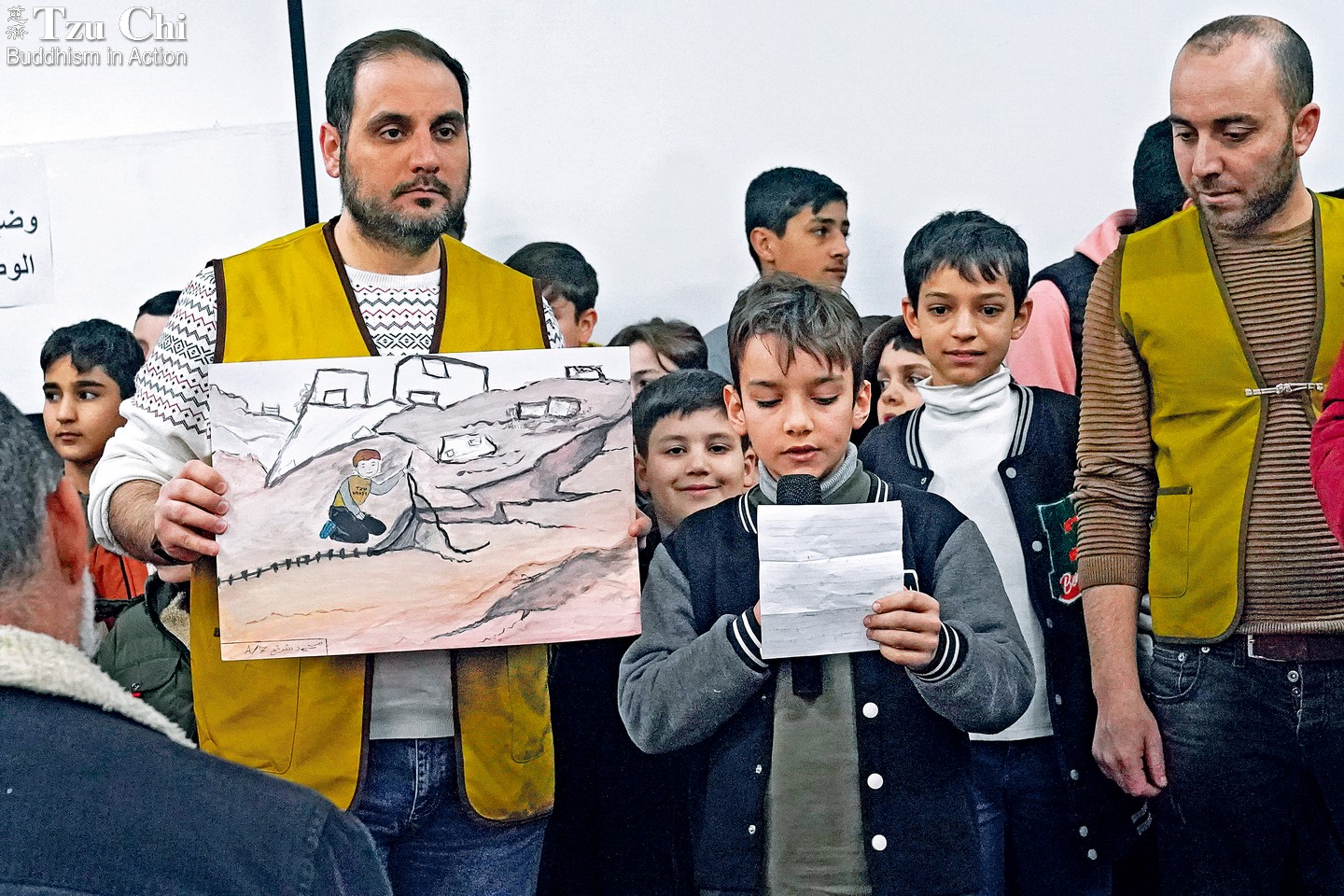
A Syrian refugee volunteering in a Tzu Chi distribution for quake survivors hugs an aid recipient (above). Students at El Menahil International School created pictures to convey their best wishes for survivors. They also donated money to help with Tzu Chi’s relief efforts. TOP PHOTO BY MOHAMMED NIMR ALJAMAL; BOTTOM PHOTO BY MUSTAFA HAMWIEH
Relief efforts in Türkiye
A Tzu Chi delegation from Taiwan arrived in Istanbul, in northwestern Türkiye, on the first Saturday after the quakes, February 11. After meeting with local volunteers, they started working to organize relief work for quake survivors.
The Tzu Chi team flew to Ankara, Türkiye’s capital, on February 12 to meet with the nation’s vice president, Fuat Oktay. This was via the introduction of Ali Uslanmaz, a former deputy governor of Kayseri Province. Tzu Chi finally obtained permission to enter areas hit hard by the quakes. Early on the morning of February 15, an advance Tzu Chi team set off from Istanbul, and after traveling for more than 1,000 kilometers (620 miles), arrived in the hard-hit Hatay Province, which borders Syria.
The volunteers set up a disaster response center at a hotel owned by a friend of former deputy governor Ali Uslanmaz, then began visiting shelters for survivors. They also conferred with personnel from other relief organizations to explore possible partnerships.
“We also assessed damage in provinces near Hatay Province to evaluate whether to hold distributions there,” said Simon Shyong (熊士民), deputy CEO of the Tzu Chi charity mission and a member of the Tzu Chi delegation from Taiwan. He said that their team’s mission was to assess who should receive Tzu Chi’s aid, how to get relief items into the disaster zone, and where to temporarily store those items. He explained that they would follow Tzu Chi’s guiding principles for relief work and find locations in which Tzu Chi could personally distribute aid to survivors. “We’ll also explore possibilities to help with the reconstruction work in the future.”
Many survivors flooded into Istanbul after the quakes to seek help from or live temporarily with their relatives. Tzu Chi Türkiye mobilized volunteers to visit this group of people and compile recipient rosters for distributions. Aid was subsequently distributed from February 17 to 19 to 1,044 families. The items given out included blankets, scarves, and gift cards.
“Their houses had collapsed in the earthquakes,” said Faisal Hu (胡光中), a Tzu Chi volunteer in Türkiye, referring to the aid recipients. “Left with nothing, they had no choice but to come to Istanbul to seek help from their friends or relatives. Our aid can help tide them over a difficult time.” Hu said that Tzu Chi Türkiye mobilized nearly 300 Syrian refugee volunteers to make home visits. From the visits, the volunteers learned that what was most needed by the survivors was items that could protect them from the cold. Volunteers therefore quickly set to work purchasing blankets for distribution.
Twenty-four years ago, in 1999, a strong earthquake hit Türkiye on August 17. Tzu Chi had at the time purchased blankets at a discounted price from a local manufacturer for distribution to quake survivors. Volunteers were happy to learn that the manufacturer was still in business after all these years. Even better, the manufacturer agreed to sell blankets to Tzu Chi for a reduced price again. They also agreed to rush to get the order out.
On the eve of the distributions, the first shipment of blankets—more than 2,600—arrived at El Menahil International School by truck. All the male teaching and administrative staff at the school turned out to unload the goods. They finished unloading and moving all the blankets into a storage space in just half an hour. The first man to climb onto the truck for the unloading had been Cuma Serya, the principal of the school. “Every one of us feels that those who can help others are the happiest,” the principal said. “We had a great time unloading the blankets. We hope to share with everyone the joy we feel.”
Whether it is extending care to quake survivors who are staying in Istanbul or providing emergency aid in the disaster zone, a lot of relief supplies and manpower are needed. Fortunately, because Tzu Chi established El Menahil International School for Syrian refugee children and has also for years been helping refugee families, the foundation has developed a strong team which can be tapped when help is needed to carry out work in response to a disaster or other emergency events. In addition, many graduates of the school, now in college, are willing and capable of assisting Tzu Chi with its disaster relief work.
“The volunteers we need will have to be able to speak Turkish, Arabic, and English,” said volunteer Hu. He explained that the Syrian young people from whom they are planning to enlist as volunteers are 11th and 12th graders at the school and graduates that are attending college. They will provide help, such as interpreting for Tzu Chi volunteers from Taiwan visiting Türkiye for the quake relief work. “I’ve asked the school to collect information on the following: what students have special talents; their majors in which university; what languages they can speak; the dates on which they will be free to volunteer, etc. We’ll build a database with this information to facilitate our future work.”
Hu added that the school’s staffers he had talked to had told him that whether Tzu Chi needed a hundred people or even 300, there would be no problems. They said they could quickly organize a big enough team of volunteers for Tzu Chi. “I believe they can,” Hu said with confidence.
Aside from the disaster areas in southern Türkiye, Tzu Chi has also launched work to help survivors in northern Syria. Chen Chiou Hwa (陳秋華), a volunteer in Jordan, said that Tzu Chi Jordan had prepared over 10,000 jackets, pairs of shoes, hats, and gloves for affected Syrians. There were, additionally, Taiwanese businesspeople who had said they’d donate winter clothing to help. If things went as expected, the United Nations would help transport Tzu Chi’s aid supplies from northern Jordan into southern Syria and deliver them across areas controlled by the Syrian government into the disaster zone in the north, controlled by resistance forces.
For the quake survivors, the path to recovery won’t be easy, but hopefully, love from across the globe will help them get back on their feet.
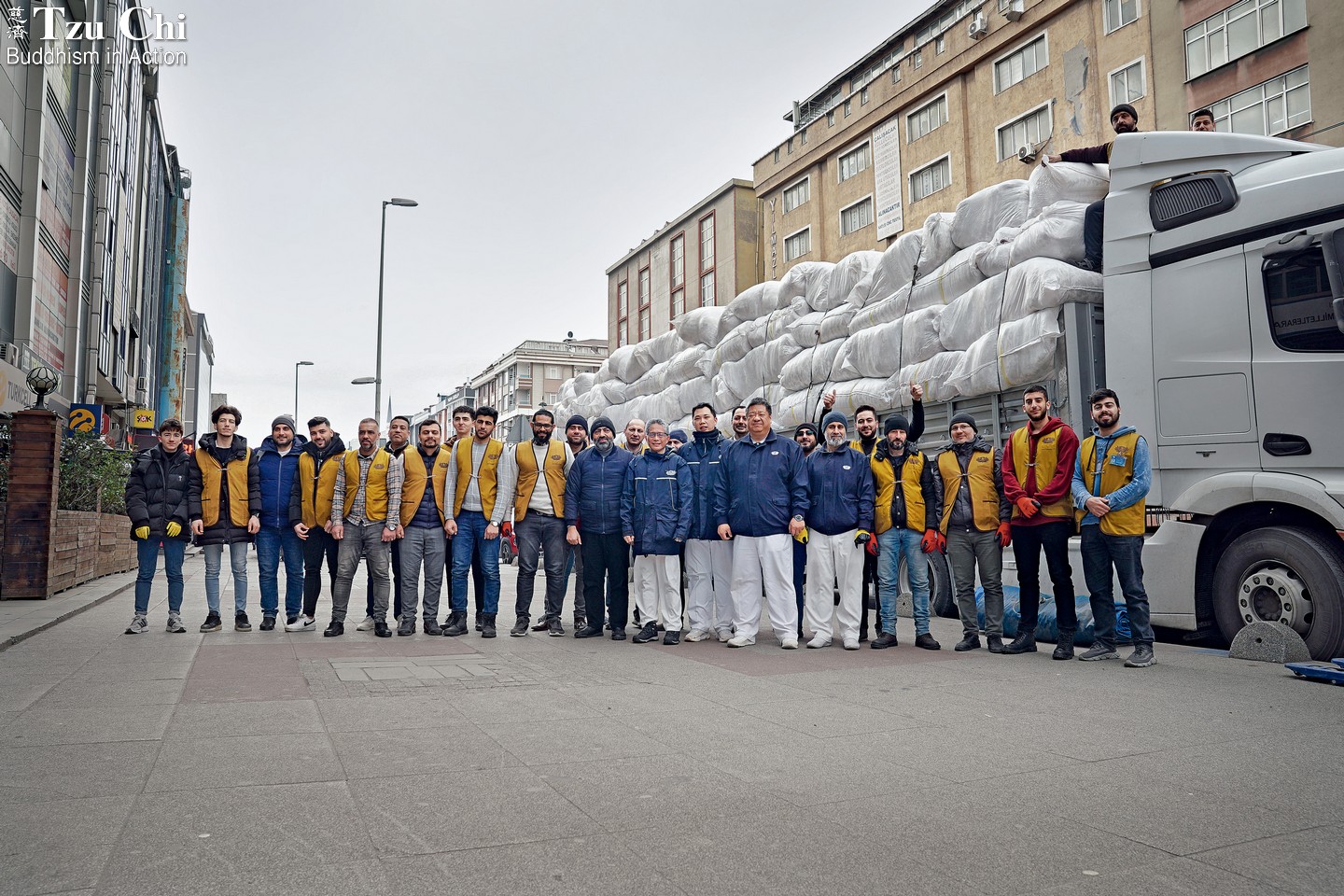
Tzu Chi purchased 10,000 blankets in Istanbul for distribution to quake victims. When one of the shipments arrived at El Menahil International School, male teaching and administrative staff gathered to unload the blankets. MOHAMMED NIMR ALJAMAL
